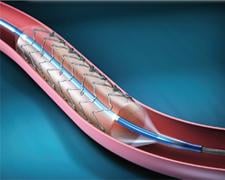
April 6, 2011 – A pooled analysis of the SPIRIT II, III, IV and COMPARE trials further reinforces the positive clinical performance of an everolimus eluting coronary stent system. As part of the analysis, two-year results on the safety and efficacy of Abbott’s Xience V was compared to Taxus Liberte and Taxus Express2 paclitaxel-eluting coronary stent systems were presented at the American College of Cardiology's (ACC) Scientific Session in New Orleans.
In a presentation given by Dean J. Kereiakes, M.D., medical director of The Christ Hospital Heart and Vascular Center in Cincinnati, Ohio, predictors of artery re-blockage, cardiac death or heart attack were evaluated out to two years in nearly 7,000 patients from the SPIRIT II, III, IV and COMPARE clinical trials.
The data demonstrated that use of Xience V resulted in significantly lower clinical event rates following a stent procedure. In the pooled analysis, it demonstrated a 36 percent reduction in the risk of major adverse cardiac events (MACE) compared to Taxus (7.3 percent for Xience V versus 11.1 percent for Taxus, p-value
"Xience V consistently demonstrated low adverse cardiac event rates in trial after trial," said Kereiakes. "The SPIRIT II, III, IV, and COMPARE pooled analysis suggests that Xience V reduced the occurrence of adverse events compared to patients treated with the Taxus stent. The low event rates demonstrated by Xience V in these trials are especially impressive given the complexity of patients in the SPIRIT IV and COMPARE trials and confirm that the results seen with Xience V in earlier randomized clinical trials are consistent with clinical practice."
In addition to the 36 percent reduction in the risk of overall MACE, data also were presented at ACC from the pooled analysis that demonstrated the following for Xience V:
• A 47 percent reduction in the risk of heart attack (2.9 percent for Xience V versus 5.5 percent for Taxus, p-value
• A 40 percent reduction in the risk of cardiac death or heart attack (4.0 percent for Xience V versus 6.6 percent for Taxus, p-value
• A 36 percent reduction in the risk of ID-TLR (4.1 percent for Xience versus 6.6 percent for Taxus, p-value
• A 70 percent reduction in the risk of stent thrombosis, defined as definite or probable according to ARC (Academic Research Consortium) (0.7 percent for Xience V vs. 2.3 percent for Taxus, p-value
"The pooled analysis of the SPIRIT II, III, IV and COMPARE trials further supports the strong body of clinical evidence that has made Xience V a leading drug eluting stent technology for patients and physicians," said Charles A. Simonton, M.D., FACC, FSCAI, divisional vice president, medical affairs, and chief medical officer, Abbott Vascular. "Xience V's long-term clinical performance is backed by clinical data from more than 30,000 patients worldwide."
The SPIRIT trials were sponsored and conducted by Abbott. SPIRIT IV included 3,690 patients, many of whom presented with multiple medical complexities, including more than 1,100 patients with diabetes, and patients with small vessels, long lesions, and multiple lesions. The COMPARE study was a physician-initiated trial involving 1,800 patients with complex vascular disease. This pooled analysis was performed independently of Abbott. Taxus Liberte was the control in COMPARE and Taxus Express2 was the control in SPIRIT II, SPIRIT III and SPIRIT IV.
For more information: www.abbott.com, www.xiencev.com


 January 05, 2026
January 05, 2026 









